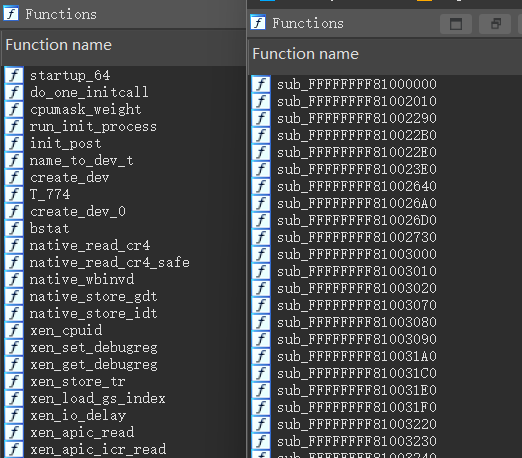System.map¶
Warning
The current page still doesn't have a translation for this language.
You can read it through Google Translate.
Besides, you can also help to translate it: Contributing.
System.map 文件是Linux内核编译过程中生成的一个重要文件。它包含了内核符号和它们对应的内存地址。这些符号包括内核函数、变量以及其他在内核中定义的重要符号。当我们获得的vmlinux是stripped时就需要System.map来帮助我们调试。 System.map 文件是一个纯文本文件,每一行包含三个字段:
符号地址(内存地址) 符号类型(例如:函数、变量)如果为小写,则符号为本地符号;如果大写,符号为全局(外部)。 符号名(标识符)
└─$ head System.map
0000000000000000 A VDSO32_PRELINK
0000000000000000 D __per_cpu_start
0000000000000000 D per_cpu__irq_stack_union
0000000000000000 A xen_irq_disable_direct_reloc
0000000000000000 A xen_save_fl_direct_reloc
0000000000000040 A VDSO32_vsyscall_eh_frame_size
00000000000001e7 A kexec_control_code_size
00000000000001f0 A VDSO32_NOTE_MASK
0000000000000400 A VDSO32_sigreturn
0000000000000410 A VDSO32_rt_sigreturn
在ida中为stripped的vmlinux添加System.map¶
加载以下脚本,然后选择对应的System.map文件
import idaapi
def load_system_map(file_path):
with open(file_path, "r") as f:
for line in f:
parts = line.split()
if len(parts) < 3:
continue
addr = int(parts[0], 16)
symbol_type = parts[1]
symbol_name = parts[2]
# if symbol_type in ['T', 't', 'D', 'd', 'B', 'b']: #如果符号表太大,可以针对性添加
if not idaapi.add_entry(addr, addr, symbol_name, 0):
print(f"Failed to add symbol: {symbol_name} at {hex(addr)}")
else:
print(f"Added symbol: {symbol_name} at {hex(addr)}")
system_map_path = idaapi.ask_file(0, "*.map", "Select System.map file")
if system_map_path:
load_system_map(system_map_path)
else:
print("No file selected")
加载前后对比 
直接修复vmlinux¶
如果你想直接修复vmlinux,可以参考https://github.com/marin-m/vmlinux-to-elf